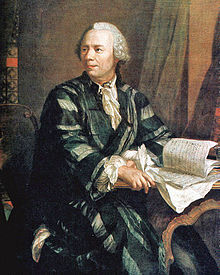
Anyone who has done any serious mathematics needs no introduction to the name Leonhard Euler, one of the all time greats of Mathematics.
For those who do, let me simply clip the opening words of the Wiki biographical article:
a pioneering Swiss mathematician and physicist. He made important discoveries in fields as diverse as infinitesimal calculus and graph theory. He also introduced much of the modern mathematical terminology and notation, particularly for mathematical analysis, such as the notion of a mathematical function.He is also renowned for his work in mechanics, fluid dynamics, optics, and astronomy. Euler spent most of his adult life in St. Petersburg, Russia, and in Berlin, Prussia. He is considered to be the pre-eminent mathematician of the 18th century, and one of the greatest mathematicians ever to have lived. He is also one of the most prolific mathematicians ever; his collected works fill 60–80 quarto volumes.A statement attributed to Pierre-Simon Laplace expresses Euler’s influence on mathematics: “Read Euler, read Euler, he is the master of us all.”
As just one of his many results, we have the astonishing little expression:
0 = 1 + e^i*pi
. . . which ties together the main numbers and operations of mathematics in one little equation that beautifully points to a unifying mind behind nature.
What may be less well known is that Euler was a Christian (apparently of Calvinist bent) and engaged in refutations of free thinking so called. In reply to the skepticism of his day, speaking of skeptical attempts to dismiss the foundation of the gospel in the death burial and resurrection of Jesus witnessed by the Apostles and others, he made the following observation and rebuke:
The apostles and a multitude of Christians [–> 500+ eye witnesses, recorded about 25 years after the event while most of these were still alive with an implied invitation to check them, cf here on] unanimously agree not only that Jesus Christ rose from the dead, but also that they have seen him with their own eyes since the resurrection and that they even communicated with Him. If one has paid attention to the doctrine and to the constancy with which it been maintained [–> i.e. in the teeth of not only objections but dungeon, fire and sword or worse], one cannot say with any semblance of truth that one has believed nothing of what has been said in this regard and that it is thus an obvious lie. One would be even less likely to say that the apostles were seduced by false imagination and that their facts were nothing but an illusion. Either that or we will be forced to state that God had miraculously blinded them all at the same time in order to propagate a false doctrine . . . .
The resurrection of Jesus Christ is . . . an incontestable fact, and since such a miracle can only be the work of God alone, it is thus impossible to doubt the divinity of the Savior’s mission. Consequently, the doctrine of Christ and his apostles is divine, and since its goal is our true happiness, we can be most assured of our belief in all the promises that the Gospel has made to us, both for this life and the one to come, and we can regard the Christian religion as a work of God who is tied to our salvation. It is not necessary to expand any further on these reflections, since it is impossible for anyone, once they are convinced of the resurrection of Jesus Christ, to retain the slightest doubt about the divinity of the Holy Scripture.
The freethinkers cannot put forward anything plausible against this bedrock on which the divinity of the Holy Scripture firmly rests. When they are forced to turn their attentions to this, they do all they can not to address the root of the question. They resort to all manner of loopholes to change the subject and attack other items, where they claim to find incomprehensible things and even contradictions . . . .
The freethinkers have yet to produce any objections that have not long been refuted most thoroughly. But since they are not motivated by the love of truth, and since they have an entirely different point of view, we should not be surprised that the best refutations count for nothing and that the weakest and most ridiculous reasoning, which has so often been shown to be baseless, is continuously repeated. If these people maintained the slightest rigor, the slightest taste for the truth, it would be quite easy to steer them away from their errors; but their tendency towards stubbornness makes this completely impossible. [From: A DEFENSE OF THE REVELATION AGAINST THE OBJECTIONS OF FREETHINKERS, BY MR. EULER FOLLOWED BY THOUGHTS BY THE AUTHOR ON RELIGION, OMITTED FROM THE LAST EDITION OF HIS LETTERS TO A PRINCESS OF GERMANY, 1805, point XXXIV on. (It is well worth the pause to read the printer’s remarks on how these things came to be excluded from the generally accessible editions of the work.)]
It is of sobering concern to us today, that these same points of concern seem to continually come up in the remarks of ever so many of today’s skeptical objectors to design theory and more.
A voice from the past we need to listen to, and to heed. END